Forums:
Following Rick's suggestion I'm putting a series of photos of Yucca whipplei as it throws up a flower spike in our garden. The plant is relatively young, only 7 or 8 years from seed, and I hadn't expected any flowering for quite some time yet. Unfortunately it is one of the forms that doesn't produce offsets so this flowering will be a glorious finale! So here it is on 22/4, 25/4 and 28/4... how high will it get?!

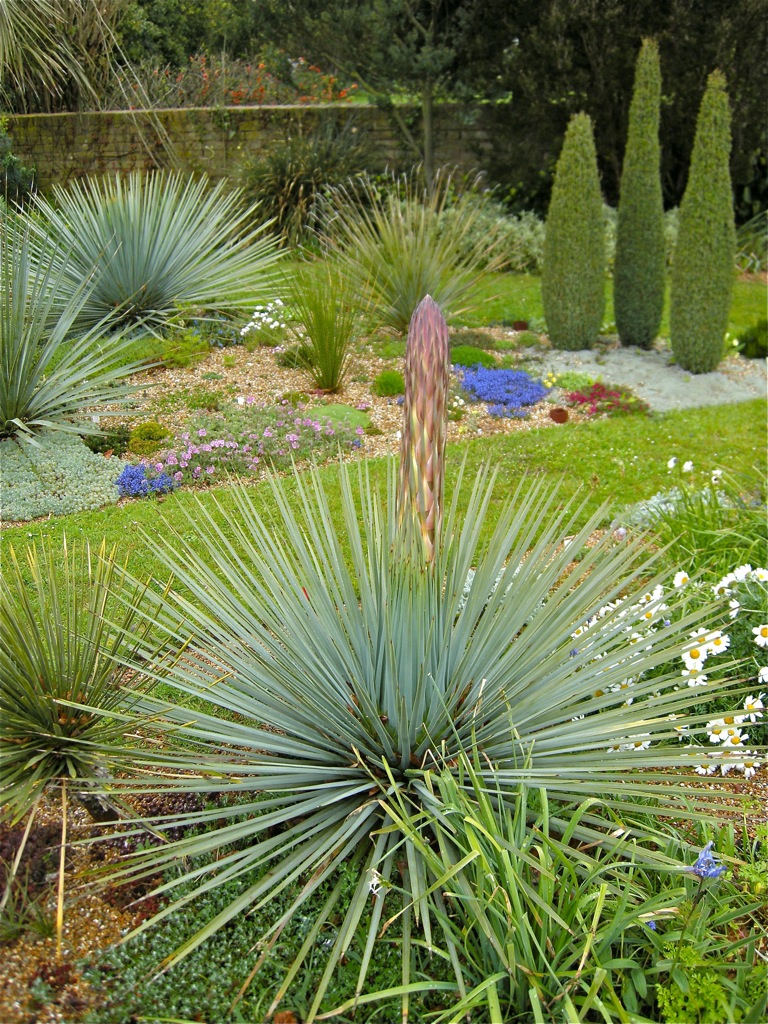
Comments
Trond Hoy
Re: Yucca whipplei
Sat, 04/28/2012 - 1:59pmHope you get a huge batch of seed! Or is it self incompatible?
DesertZone (not verified)
Re: Yucca whipplei
Sat, 04/28/2012 - 3:49pmWOW...your garden is amazing. :)
Richard T. Rodich
Re: Yucca whipplei
Sat, 04/28/2012 - 10:12pmWow! :o I hadn't realized the girth of that stalk before!
It's going to be gigantic!
Claire Cockcroft
Re: Yucca whipplei
Sun, 04/29/2012 - 11:03amHere are a couple of pictures from my sister's acreage in San Diego, California. A gorgeous plant -- and yes, I collected a lot of seed and sprouted a whole pot of seedlings, most of which I gave to Rick Lupp. :)
Richard T. Rodich
Re: Yucca whipplei
Sun, 04/29/2012 - 5:43pmThe color is gorgeous, Claire! Wow!
Trond Hoy
Re: Yucca whipplei
Mon, 04/30/2012 - 1:53amJust the colour? I think the whole plant is marvellous!
John P. Weiser
Re: Yucca whipplei
Mon, 04/30/2012 - 8:19amI've had various yucca species send boom stalks twelve foot tall. (3.5meters)
I don't have die back after blooming of my yuccas. You may find that they will add new side shoots however.
Likely hood of getting viable seed is almost impossible without hand pollination. It's not so much a question of being self incompatible as being pollinator specific. Yuccas in nature are pollinated by very specific moth species. This is a very interesting co-evaluation and co-dependance. here are a couple of articles for those who want to know more.
http://waynesword.palomar.edu/ww0902a.htm
http://www.emporia.edu/ksn/v41n2-june1995/introduction.htm
Tim Ingram (not verified)
Re: Yucca whipplei
Mon, 04/30/2012 - 2:21pmClaire - I didn't realise that the flowers could be so strongly coloured! It increases my anticipation of the flowering even more. Graham Stuart Thomas in his classic book 'Perennial Garden Plants' described Yucca whipplei as 'One of the most wonderful plants in the world' and that picture really shows why - it must be amazing to see in the wild.
I may have a go at hand pollinating if I have a tall enough stepladder!
Mark McDonough
Re: Yucca whipplei
Mon, 04/30/2012 - 8:06pmYowsa, simply fantastic :o :o :o
Tim Ingram (not verified)
Re: Yucca whipplei
Thu, 05/03/2012 - 1:31pmA quick update on Yucca whipplei as of today. The flowering spike is now showing signs of the floral structure to come. Will it show any colour in the flowers? I wait with bated breath.
Mark McDonough
Re: Yucca whipplei
Thu, 05/03/2012 - 8:12pmEver more impressive Tim! Amazing how much it has grown in 5 days since your last photo. Fun to also watch the flowering plants in the background, the blue Polygala patch is looking as bright as ever.
Hmmm, I think that I saw you identify the blue patch as a Polygala on SRGC?
John P. Weiser
Re: Yucca whipplei
Fri, 05/04/2012 - 5:31amAs do we all!!!
Trond Hoy
Re: Yucca whipplei
Fri, 05/04/2012 - 9:58amTim, I bet you are! BTW for how long can you do that?
I hope you don't get the weather we have now - storm from north >:( Some tall plants are broken, leaves and flowers are damaged in the strong wind.
John P. Weiser
Re: Yucca whipplei
Wed, 05/16/2012 - 12:00pmTim!!! :-X I'm dieing here I can't hold my breath much longer. Let us see the blossoms!
DesertZone (not verified)
Re: Yucca whipplei
Mon, 05/21/2012 - 4:56pmAny pics of ther blooms? :)
Tim Ingram (not verified)
Re: Yucca whipplei
Tue, 05/29/2012 - 12:44amSorry all - I've been a bit overwhelmed taking pictures of the yucca every day that I haven't posted any to show how it's doing! This from a few days ago as the flowers are really beginning to open. In another week or ten days it should look really magnificent. I have a second plant in the sand bed behind it which is not flowering, but which actually has a much bigger rosette. If and when that flowers it should be even more amazing. This is obviously a plant you need to plant every year if you have space, to keep more regular flowering year by year. Are there any other yuccas at all comparable with this? It is more reminiscent of agaves and dasylirions.
John P. Weiser
Re: Yucca whipplei
Tue, 05/29/2012 - 5:52amImpressive!!
The flowering stem is very stout. It looks a lot thicker than I see on my Y. elata.
Well done!
Trond Hoy
Re: Yucca whipplei
Tue, 05/29/2012 - 2:29pmTim, i think you have to use a ladder to admire the flowers! and the stem should support it ;)
Tim Ingram (not verified)
Re: Yucca whipplei
Wed, 05/30/2012 - 12:46amI'm afraid I might fall off onto the rosette of leaves Trond! This picture was taken a day or twoo later with the lovely Lithodora x intermedia in the foreground. Behind the yucca is something even taller, a glaucous leaved form of Ferula communis, still a little off flowering. After particularly mild winters in the past we used to also have giant echiums (pininiana) flowering with the fennel - a sort of Brobdingnagian front garden!
Richard T. Rodich
Re: Yucca whipplei
Wed, 05/30/2012 - 5:56amSuch an extraordinary specimen, that yucca!
I had to look up that Echium pininiana...
What happens in a not so mild winter for you? And does it ever die back completely to the ground?
Mark McDonough
Re: Yucca whipplei
Wed, 05/30/2012 - 9:01pmTim, your garden is sheer spectacle! Inspiring to see such fantastic plantings.
Tim Ingram (not verified)
Re: Yucca whipplei
Thu, 05/31/2012 - 10:49amThanks Mark, it's very nice of you to say so! I think few gardeners have such a passion for plants which is why it is so great to meet up with gardeners in the States. Our aim has always been to grow a very wide range of species, rarely seen in gardens (usually from wild collected seed), and then propagate these and make them available to visitors. I hope the day of the specialist nursery will return because it makes for far more interesting and diverse gardens.
Tim Ingram (not verified)
Re: Yucca whipplei
Mon, 06/11/2012 - 12:32amA final update on Yucca whipplei - summer storms and rain have rather lashed the plant but these are a few pictures showing the development of the flowering panicle again and close ups of a flower raceme and of an individual flower. What a plant to grow in your garden!
Richard T. Rodich
Re: Yucca whipplei
Mon, 06/11/2012 - 7:15amWeather can sure prevent those prize photos that you would cherish forever, can't it...
But the ones you show here are superb!
Very curious how fat the filaments, especially below the anthers. Any story about that? Is this normal for the whole genus?
John P. Weiser
Re: Yucca whipplei
Mon, 06/11/2012 - 10:00amRick
The fat filaments come standard in this genus. What I find kind of unique is the lacy crown of filaments around the edge of the stigma tip.
Here are close ups of some of the yuccas I grow.
Yucca angustissima ssp. kanabensis
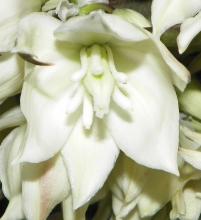
Yucca elata
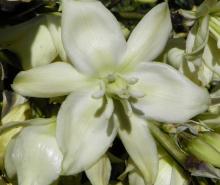
Yucca harrimaniae var. gilbertiana
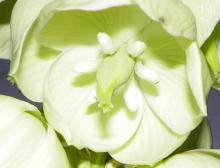
Yucca glauca ssp. glauca
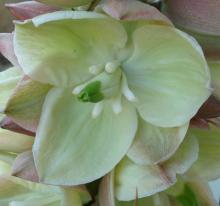
Tim Ingram (not verified)
Re: Yucca whipplei
Mon, 06/11/2012 - 12:56pmJohn - very nice to see those comparisons. Do you know how common it is amongst yuccas to have strongly coloured flowers? There was that amazing example earlier on of Y. whipplei, and I know of Y. glauca from Claude Barr's book. I was also quite struck by the strong scent (of lemons) of the flowers - maybe more pronounced in the evening? I have a plant of Y. thompsoniana just producing a flower spike and will look at this more closely than I have before.
Trond Hoy
Re: Yucca whipplei
Mon, 06/11/2012 - 1:11pmThe Yuccas are beautiful! Both the plant and the flowers ;D
John P. Weiser
Re: Yucca whipplei
Mon, 06/11/2012 - 2:20pmI do not think it is very common to have strongly colored flowers on mature blossoms. My Yucca angustissima ssp. kanabensis and one of my Yucca glauca ssp. glauca have rose/purple flushes to the outside surface of the flowers when they first start to develop. But it quickly fades to cream as they gain size. The Y. elata does have deep brown stems on the inflorescence a nice contrast to the creamy white flowers.
I have never detected any fragrance to the blossoms of my Yuccas. That is interesting!
Below you may be able to discern the brown stems of the Yucca eleta that is if you can see between the flowers. The second photo is a closeup of the flowers and stem before they were fully open.
DesertZone (not verified)
Re: Yucca whipplei
Tue, 06/12/2012 - 4:23pmLove the yucca flower line up. Nice pic everyone. :)
Trond Hoy
Re: Yucca whipplei
Wed, 06/13/2012 - 1:13amIf I didn't already know that I wish I could grow Yuccas, I would know now for sure ;D
Tim Ingram (not verified)
Re: Yucca whipplei
Sat, 07/14/2012 - 12:57amThere is a saying that you wait for ages for a bus to come along, and then two come at the same time! After the first plant of Yucca whipplei flowered in our garden I am quite dismayed that the second is also doing so - it will be a long wait to sow seed and wait for another flowering! The picture shows it with Dierama pulcherrima in the foreground. Behind it is a very perennial, and perennially flowering, Yucca thompsoniana, closely related to Y. rostrata. This was also grown from seed and is getting better year on year, although mature plants of rostrata (presumably wild dug) are occasionally seen in gardens here.
DesertZone (not verified)
Re: Yucca whipplei
Sat, 07/14/2012 - 6:51amThat is so cool. Love the pic with both flowers.
What palm sp. is that?
Tim Ingram (not verified)
Re: Yucca whipplei
Sat, 07/14/2012 - 9:31amThe palm is Butia capitata - it didn't much like last winter's low of -14°C but seems to be growing out again OK. I've tried a few others like Washingtonia and the beautiful Brahea armata with no luck outside.
DesertZone (not verified)
Re: Yucca whipplei
Sat, 07/14/2012 - 9:06pmSo glad it made it through that kind of cold. Looks a little different than the one I seen over here. Nice looking palm, and great looking yuccas. :)
Tim Ingram (not verified)
Re: Yucca whipplei
Tue, 07/17/2012 - 12:31pmIt's quite difficult to deal with Yucca whipplei after it has flowered! I decided to cut all the leaves back to the centre and then thought this made rather a good piece of Garden Sculpture, as well as reminding me of the amazing flower spike earlier on. I don't know how long this will last; will be interesting to see!
Mark McDonough
Re: Yucca whipplei
Thu, 07/19/2012 - 8:06pmTim, it is hard to imagine how you cut all those leaves back so neatly, and secondly, how did you even begin the process of cutting the first leaves with its formidable defensive periphery of dagger-sharp leaves. ;)
Merlin (not verified)
Re: Yucca whipplei
Thu, 07/19/2012 - 9:44pmThat is pretty cool! I can say I would never thought of doing that, if i'm still alive and if my Yucca harrimaniae ever blooms perhaps i will give that a try.
Stephen Barstow
Re: Yucca whipplei
Sat, 08/11/2012 - 3:49amThere's a good article with Tim Ingram and his Yuccas in the August issue of RHS The Garden magazine!
Martin Tversted (not verified)
Re: Yucca whipplei
Wed, 10/03/2012 - 6:40amTim, did you take seeds, many forms dont form offsets and just die. Often the whipplei group is placed in their own genus Hesperoyucca. They cannot be crossed with yuccas though all other yuccas can interbreed.
Martin
Claire Cockcroft
Re: Yucca whipplei
Wed, 03/06/2013 - 12:21pmI visited my sister near San Diego, California and took a picture of yet another Yucca whipplei -- this one looks like it might bloom this year. As you might recall, the flowers on this form are white and dark maroon. Should it bloom, I will be sure to get seeds to share before the yucca moth can ruin them all.